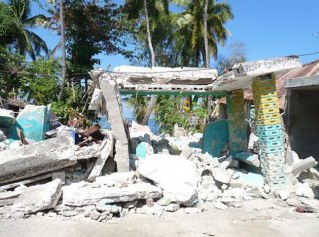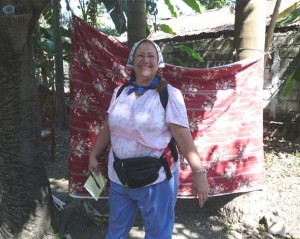Florida Lactation Consultant Association | home
Breastfeeding Help Links | Florida Breastfeeding Law | Lactation Education Offering Links | Policy Statements | Professional Links for Lactation Consultants | The Gold Standard | Hatti | April 13 & 14, 2012 FLCA Conference Handouts
Hatti
 |
 |
'Madama Tete,' with her makeshift lacta-tion clinic, a sheet strung up between
|
|
The recent earthquake in Chile on the heels of the massive earthquake disaster in Haiti are a fresh re-minder that emergencies can happen any time, any place. In the midst of recovery and relief efforts, these two disasters bring renewed concerns about the needs of infants and children, who are the most vulnerable in a disaster. Breastfeeding is the first line of defense for infants and children in an emer-gency, and International Board Certified Lactation Consultants (IBCLCs) can make a difference in edu-cating and supporting the families, relief workers, and health care providers involved.
ILCA member Margie Forrest, a Florida USA IBCLC, just re-turned from an outreach trip to the coastal community of Petit Goave, Haiti, located west of Port-au-Prince, and discov-ered firsthand the important role of IBCLCs in an emergency. She went as part of a Florida interdisciplinary medical team that included physicians, nurses, psychologists, a social worker (who provided play therapy for children), and Margie as the team`s lactation consultant.
A former Red Cross disaster nurse since Hurricane Andrew in 1992 and a Red Cross volunteer for over 40 years, Margie has volunteered in many emergencies. She reports that the disaster in Haiti was the worst she has ever encountered.
I think one of the biggest issues this time is that people can't really move on. Most disasters happen, it's terrible, and then it's over and the cleaning up and rebuilding begins. In Haiti, the aftershocks con-tinue. The entire country has post-traumatic stress disorder, and it is refreshed with every tremble of the earth. No one sleeps indoors. In the town of Petit Goave, people own houses and furniture. They are used to sleeping in beds. Now they all sleep outdoors. In the evenings, they stake out their territory in front of the houses with large bricks or stones that they've saved from the rubble, and either set up a tent (if they're lucky enough to have one) or a shelter they construct with branches and sheets or tarps (again, if they're lucky) and sleep out on the street. They all have colds, bronchitis, and/or respiratory issues. The dust is still thick, as the cleaning up continues.
Madame Tete,. as the villagers called her, was able to set up a lactation clinic under the trees to assist mothers with breastfeeding questions and concerns. She reports that the primary concerns were real or perceived low milk produc-tion, with many women fearful that the disaster would take away their milk. She was able to reassure many mothers that they can breastfeed more to keep their production up. She reports that breastfeeding mothers who were exclu-sively breastfeeding were very proud that they can provide nourishment for their babies.
Margie also did advocacy work in Haiti to help educate others about the importance of breastfeeding. She was able to conduct an hour-long radio broadcast that has been re-aired across the country several times and will soon be archived on the station`s website. During the radio broadcast she used ILCA`s .Background Document. from the World Breastfeeding Week kit to deliver vital messages about the im-portance of breastfeeding in an emergency.
Margie was also able to meet with heads of relief organizations to discuss the importance of breastfeed-ing, and widely distributed ILCA`s .Breastfeeding in Emergencies: Tips for Relief Workers. which were recently translated into French, Spanish, and Creole thanks to the generous contributions of ILCA mem-bers. She said the materials were very helpful in dispelling myths about breastfeeding in emergencies. She also provided information and resources for local healthcare providers on the ground.
from March 2010 ILCA eGlobe
© 2002 - 2012 Florida Lactation Consultant Association, all rights reserved.
This internet site provides information of a general nature and is designed for educational purposes only.
If you have any concerns about your own health or the health of your child, you should
always consult with a physician or other healthcare professional.